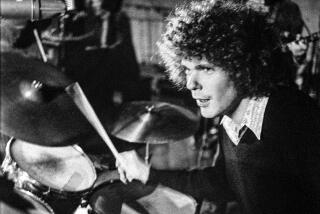Max Gordon; Village Vanguard Founder
- Share via
Max Gordon, who since 1935 ran a celebrated cellar in New York City called the Village Vanguard, died Thursday at the age of 86.
Gordon, considered the patron saint of New York jazz, entered a New York hospital Wednesday night for a gallbladder operation and died shortly after midnight of complications from surgery, friends of his family said.
Reaction from many of the giants of jazz who had worked his world-famous room was instantaneous.
“He was truly a friend to the musician,” United Press International quoted drummer Max Roach as saying. Roach, who remembered sneaking into the club as a youth by drawing a mustache across his upper lip with eyebrow pencil, said “all the musicians loved Max Gordon.”
Gordon came to the United States five years after he was born in Lithuania in 1903. He studied writing at Reed College in Portland, Ore., but decided that he wanted to live in Greenwich Village. He briefly attended law school at Columbia University and then worked a series of odd jobs before scraping up the cash to open what was eventually to become the Vanguard.
In 1943, he started another club, the swank Blue Angel, where chanteuse Edith Piaf made one of her first U.S. appearances, and ran it until it closed in 1964.
But it was the Village Vanguard, from which Gordon took the title of his 1980 book, “Live at the Village Vanguard,” that remained closest to him.
At a birthday celebration in March, 1988, Gordon was roasted for his lack of financial acumen (“In 50 years this place hasn’t made a dime,” noted comic Irwin Corey) and toasted for his devotion to music. Mel Lewis, the drummer and band leader who has played for more than two decades at Gordon’s club, noted in the New York Times that “after 22 years ours is not a business relationship but like father and son. . . . The Village Vanguard is a house of culture and he’s its master.”
The small triangular club at 178 7th Ave. has been a haven for classic jazz (as opposed to fusion, which Gordon detested) for about half its history.
Before the mid-1950s, it was home to beat poets, musical revues (including one featuring Judy Holiday) and folk singers (Leadbelly, Josh White, Pete Seeger among others). It also was a showcase for comics Woody Allen, Mort Sahl and Lenny Bruce (“I used to pay him $3,500 a week,” Gordon said. More than I paid anybody at the time.”)
Gordon was a fixture at the Vanguard well into his 80s, telling Who’s Who in 1987: “I am still operating the Village Vanguard. It is open every night. The New Yorker calls it ‘the greatest jazz club in the world.”’
Sue Mingus, the widow of bassist Charles Mingus, said she could not imagine the intimate club without him.
“Max has been in there every night, even if he’s asleep in his bedroom slippers,” she said. “His wife, Lorraine, said she thought at first of closing down for the night (after his death) but then she said, through her tears, ‘Max would be saying, “How are we going to pay the musicians and the bar bill?’ ”
More to Read
The biggest entertainment stories
Get our big stories about Hollywood, film, television, music, arts, culture and more right in your inbox as soon as they publish.
You may occasionally receive promotional content from the Los Angeles Times.









